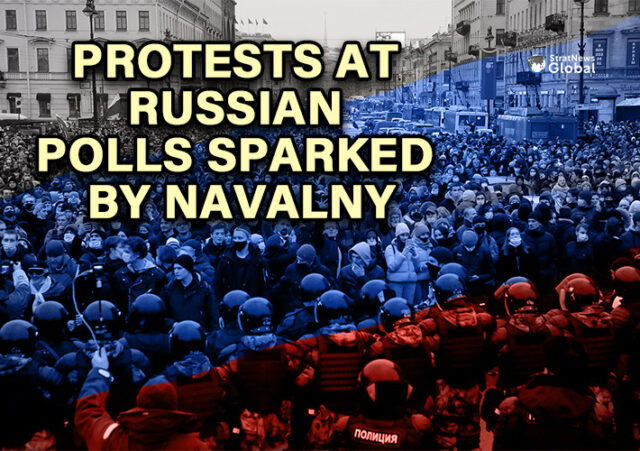Russia witnessed protests at various polling stations on Sunday, the final day of voting in the presidential election expected to secure Vladimir Putin’s prolonged grip on power.
As the noon hour approached, lines swelled suddenly at some polling locations across the country. This timing coincided with calls from supporters of the late opposition leader Alexei Navalny, urging Russians to collectively turn out at that hour as an act of defiance against Putin’s authoritarian rule.
Navalny, Putin’s most formidable political foe, died in February at age 47 in an Arctic prison in circumstances his aides claim amounted to murder by the Kremlin. Prior to his death, the anti-corruption campaigner had worked to rally opposition to Putin despite being routinely arrested and facing legal troubles.
Navalny’s widow Yulia has carried on his efforts to undermine Putin’s power through protests and other acts of dissent. Earlier this month, she urged Russians to participate in the “noon action” by showing up simultaneously at polling booths on election day to register their opposition.
In the capital Moscow, a CNN team observed the line rapidly growing within a 5-10 minute window around noon at one polling place, estimating around 150 people had arrived. Voters cited heeding Yulia Navalnaya’s call for the noon protest as their motivation.
Similar scenes played out elsewhere, with news agencies and social media reporting long queues emerging simultaneously at polling sites in different cities like St. Petersburg and Novosibirsk. Navalny’s team encouraged the midday turnout, promoting it as a way for dissenters to visibly register discontent with Putin’s regime.
The noontime demonstrations represented a form of civil disobedience amidst an election virtually guaranteed to hand Putin another term extending his long tenure in power potentially until 2036. While the official turnout exceeded 70% nationwide, thousands heeded the calls to stage the symbolic noon protests at a time when overt criticism of the Kremlin has been severely constrained.
In other incidents, people poured dye in ballot boxes, started fires or lobbed Molotov cocktails as small acts of civil disobedience, said CNN. In total, 29 polling stations across 20 regions in Russia have been targeted by “narrow-minded people,” said the head of the Electoral Commission, Ella Pamfilova, according to Russian state news agency Tass.
“The pseudo-elections in Russia are neither free nor fair. The result surprises no one,” said a German Foreign Ministry statement. “Putin’s rule is authoritarian and relies on censorship, repression and violence. […] The ‘elections’ in the occupied territories of Ukraine are invalid and a further violation of international law,” the ministry said.
An armed and masked soldier checks a voting cabin when a voter is inside. “Look what’s going on, and it’s been like that the whole day” – a voice is heard behind the camera, presumably of an observer.
We’ve already seen imitations and falsifications of elections in Russia, but… https://t.co/8nDVa2tVAH pic.twitter.com/04u5XtJxKI
— Anton Gerashchenko (@Gerashchenko_en) March 16, 2024
Beyond Russia’s borders, the midday activism saw Russians abroad forming lines outside their country’s embassies in cities like Berlin and London in solidarity with Navalny’s opposition movement against Putin’s tightening grip on power. The protests paid tribute to the fierce Putin critic whose recent prison death at a young age ignited outrage from his allies who decried him being murdered by the Russian state.
Navalny had posed the biggest challenge to Putin’s nearly quarter-century rule before being jailed in 2021 on fraud charges dismissed by supporters as politically motivated. From prison, he urged backers to resist Putin’s crackdown through initiatives like the “Noon Against Putin” demonstrations coinciding with the election.
Also See:
















